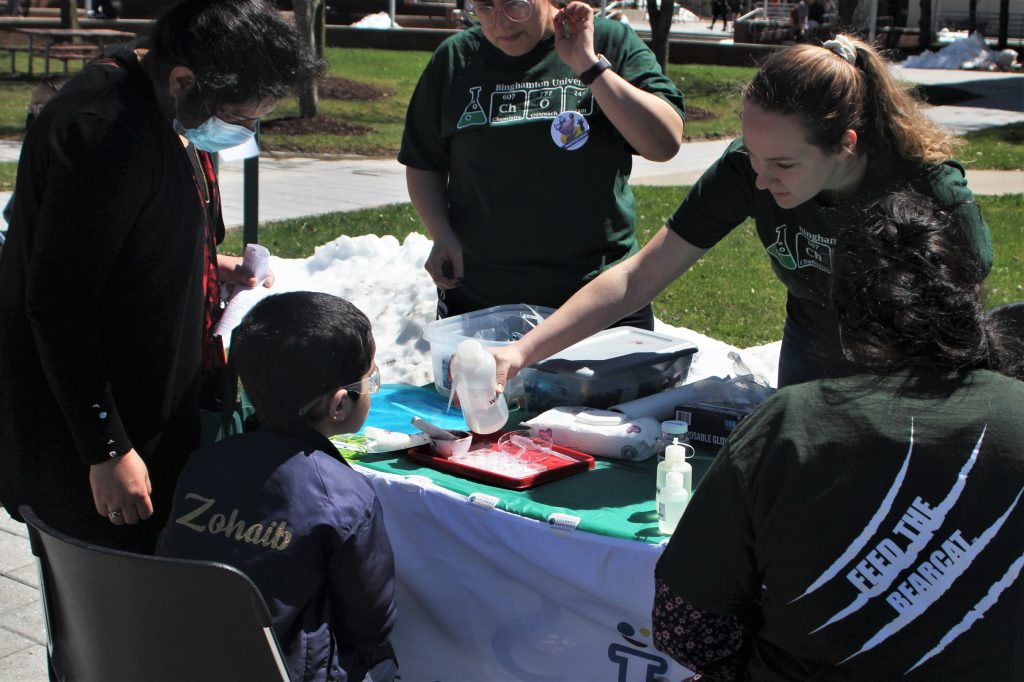Binghamton University hosted its annual Earth Day Festival and Sustainability Scavenger Hunt to celebrate sustainability.
On Friday, BU students gathered at the Spine to celebrate Earth Day. Many students represented sustainability-oriented clubs and tabled at the event to educate passersby about their mission. Some off-campus organizations, University offices and academic departments could also be visited at educational tables. The Office of Recycling and Resource Management, the environmental studies department, BU Dining Services, Transportation and Parking Services and the BU Bookstore were all sponsors for the event.
The Earth Day Festival and Sustainability Scavenger Hunt has been a part of BU’s events list for over a decade. Martin Larocca, head sponsor of the event and BU’s resource recovery manager, discussed the history of the event. He said the festival has been recurring since about 2010, while the scavenger hunt is relatively new.
“This will be the second time we are holding the scavenger hunt,” Larocca wrote in an email. “[The year] 2021 was the first Sustainability Scavenger Hunt. The scavenger hunt was created to help showcase sustainable projects on campus that are not easily shown at tabling events and as a safe event alternative during last year’s stricter [COVID-19] restrictions. The scavenger hunt is spread out across campus and completed throughout the day.”
BU’s Earth Day celebration is one of many around the world. Robert Holahan, an associate professor of environmental studies and political science, said Earth Day is important because of its history and influence on laws and practices.
“When [former U.S.] Sen. Gaylord Nelson organized the first Earth Day in 1970, it signified the first societal-wide effort toward environmental improvement,” Holahan wrote in an email. “Between 1969 to 1972, most of the major environmental laws that we still operate under today (National Environmental Policy Act [NEPA], Clean Air Act [CAA], Clean Water Act [CWA], etc.) were passed during an unusual bipartisan period of collective focus on the environment. Fifty-two years later, Earth Day exemplifies this spirit, even if the original purpose has long been forgotten.”
There were 11 locations at which attendees could learn about the many aspects of a sustainable lifestyle, such as how to eat, dress and paint in an environmentally conscious manner. An online scavenger hunt form was also available for students interested in learning and winning prizes, with participants entered into a raffle upon submission of their answers.
Three students from the archaeology department spread awareness about a garden they will be collaboratively planting with the Onondaga Nation Farm, an organization known for preserving many types of Indigenous seeds. The group needs at least 15 volunteers to help them plant this six-mound garden, which they plan to do on May 4. Cinthia Campos, a fourth-year Ph.D. student studying anthropology, said the garden would spread awareness of Indigenous communities that live in the area.
“There are changes coming on in archaeology, so it’s important to have these collaborative projects,” Campos said. “This is something that’s physical, collaborative and tangible. Students will be able to learn from it. So we will be having placards explaining the symbiotic relationships of the three sisters, maize, beans and squash. We will also be having more information in Indigenous languages to bring attention to the communities and cultures that are here.”
The Chemistry Outreach Program, a group of students with the mission of sharing safe chemistry with the community, organized a table about how chemistry can be used to create eco-friendly paint. The paint is made out of cochineal bugs, which can be crushed to create natural pigments. Benjamin Williamson, a lecturer of chemistry, said teaching others about eco-friendly chemistry is important since it can be used in everyday life.
“Everything that you see on this table, including the ground-up bug, is something you would see in just about any kitchen in America,” Williamson said. “I believe in spreading the importance of chemistry to people. I think they need to see that chemistry is not just something that happens in a lab with white coats and sterile big industry environments. Chemistry is something we all do every single day.”
Jesse Lascala, an undeclared freshman, represented BU’s Q Center, a group that provides resources for LGBTQ+ students, at a table about the textile industry. The center has a Gender Bender Closet in which students can trade their unused clothes for new ones that express their gender identity. Lascala said understanding the environmental impact of clothing is crucial for sustainability.
“The textile industry is the second largest pollution industry after gas and oil,” Lascala said. “It makes up 10 percent of our carbon emissions. Our goal is to combat that by buying clothes made to last, shopping at secondhand stores and upcycling clothing.”
Julie Hayes, a senior majoring in political science, said she attended the event to learn how to lead a sustainable lifestyle.
“I wanted to learn about sustainability and all that, like recycling,” Hayes said. “I don’t really know how to. I know to put it in the recycling bin, but that’s about it. I think that people started to go on this whole tirade about how climate change isn’t real, and it is real so I think stuff like this is important to teach people, and then they can teach other people.”



